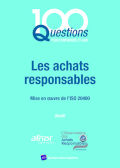
Are you in charge of purchasing for a large group, an ETI or a SME? Are you awarding public contracts for a local authority? We can help you switch to responsible purchasing mode, exercise your duty of care in your supply chain, and manage supplier risk across your entire portfolio of service providers and subcontractors.
The health crisis linked to covid-19 offers a new opportunity to question your supply chain: where are your suppliers and subcontractors located? Do they expose you to stock-outs or shortages? An opportunity to review the voluntary ISO 20400 standard on responsible purchasing, and to assess your own performance with the OK Pilot tool. With the analysis of an AFNOR Purchasing Solutions expert, to identify areas for improvement and build an action plan.
How can you manage your supplier risk?
Supplier risks: we’re all exposed!
Production delays, unethical subcontractors, manufacturers using child labor or low-cost products from the other side of the world… Don’t choose your suppliers blindly: when suppliers fail, your company suffers! All these unsuspected sources of destabilization constitute the supplier risk.
You need to be vigilant, especially if your company is buying more and more, and from further and further away, as its reputation is at stake. An exercise that requires a cost/benefit approach.
Purchasing: a CSR lever
 To prevent these risks, the company needs to take action. For larger companies, these measures are mandatory: duty of care (2017 law), anti-corruption policy (Sapin 2 law), extra-financial reporting (DPEF). Others are voluntary: ISO 20400, ISO 26000, ISO 37001… Within a company, the Purchasing department is the cornerstone of a CSR approach. Buyers, you are the guarantors!
To prevent these risks, the company needs to take action. For larger companies, these measures are mandatory: duty of care (2017 law), anti-corruption policy (Sapin 2 law), extra-financial reporting (DPEF). Others are voluntary: ISO 20400, ISO 26000, ISO 37001… Within a company, the Purchasing department is the cornerstone of a CSR approach. Buyers, you are the guarantors!
Want to learn more? Order the book Les achats responsables : mise en œuvre de l’ISO 20400 published by AFNOR Editions with the Observatoire des achats responsables.
Everything you need to know about purchasing standards
Purchasing is a strategic function within a company. It’s an important lever for giving substance to quality, CSR and sustainable development policies. To put this into practice, at their own level and with their suppliers, buyers can rely on standards that provide guidelines and list best practices. These voluntary international standards help you to frame a management system.
Forced Labour Regulation and CS3D: two steps forward for sustainable procurement
- The regulation on forced labor, with its dissuasive effect, establishes an obligation of result, backed up by a product-by-product survey.
- The CS3D, which covers human, social and environmental rights, establishes an obligation of means. Starting in 2024, the first organizations concerned will be those with over 5,000 employees and/or sales of over 1,500 million euros, i.e. around 500 French companies. In the long term, CS3D aims to bring about a systemic change in responsible purchasing practices and the deployment of effective prevention mechanisms.
|
Application date |
Companies concerned (European or not) |
|
|
Number of employees |
Worldwide sales |
|
|
2027 |
> à 5000 |
> €1,500 million |
|
2028 |
> à 3000 |
> 900 million euros |
|
2029 |
> à 1000 |
> than 450 million euros |
|
All other companies covered by the directive, including franchises in the EU generating more than 80 million euros in worldwide sales, with at least 22.5 million euros in royalties. |
||
Organizations subject to the CS3D must meet four obligations:
- Risk mapping
- The creation of evaluation procedures for subcontractors and suppliers
- Taking appropriate action to mitigate risks
- Setting up an alert and reporting mechanism
Buyers need to integrate these elements into their due diligence process, as with the Sapin 2 anti-corruption law, or the 2017 duty of care, by going beyond the audit and strengthening the relationship with their suppliers. To achieve this, we recommend using the best practices presented in the voluntary international standard ISO 20400.
